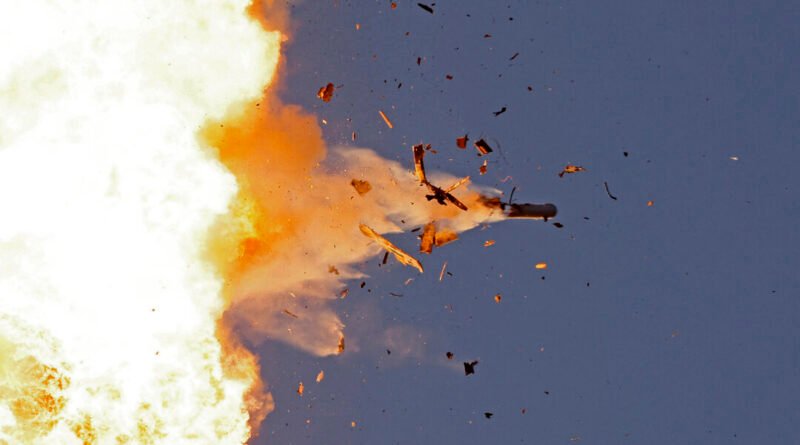Israel and Hezbollah Discuss De-Escalation Following Crossfire Incident
Both sides declared that they are not finished fighting, but neither indicated any signs of escalating the conflict into a broader war.
Following a weekend of intense strikes along the Lebanese border, Israel and Hezbollah hinted at standing down from any major escalation that could lead to a wider conflict while asserting they are not done fighting.
Hezbollah reportedly launched 230 rockets—Israel claimed 340—along with nearly two dozen UAVs. This came after 100 Israeli warplanes conducted pre-emptive strikes on thousands of Hezbollah rocket launchers early on Sunday, August 25.
Both sides claimed they targeted only military sites. Lebanese officials confirmed three casualties in the Israeli strikes, with no mention of damage or casualties reported on Israel’s side by the IDF, press, or television.
Neither side indicated a ceasefire.
Hezbollah leader Hassan Nasrallah stated that Sunday’s strike was in retaliation for Israel’s airstrike that killed senior military commander Fuad Shukr the previous month, leaving open the possibility of further retaliation. Israel cited this attack as revenge for a Hezbollah rocket strike on a soccer field that resulted in the deaths of Israeli Druze children and teenagers.
Iran, Hezbollah’s supporter, remains committed to retaliating against Israel for its alleged involvement in the assassination of Hamas leader Ismail Haniyeh in Tehran shortly after Shukr’s death. Israel has not acknowledged any role in Haniyeh’s killing.
Israeli Prime Minister Benjamin Netanyahu indicated that the exchange of fire on Sunday is not the final chapter of the conflict.
300 Rockets, Pre-Emptive Action
Nasrallah suggested that Hezbollah’s attack had caused significant damage to its intended targets. In a speech on Sunday following the attack, he mentioned that the main targets were the Unit 8200 military intelligence base at Glilot and an air defense base at Ein Shemer.
“Our data confirms that a significant number of UAVs reached these two targets, but the enemy has remained silent. The truth about the events there will be revealed in time,” he stated.
“We intended to launch 300 rockets in this operation, but we ended up launching 340 rockets without any interference from the enemy,” he added.
“The response was satisfactory, and it appears that destruction is adequate,” he continued, reserving the right to continue attacking Israel if necessary.
Rear Admiral Daniel Hagari, IDF’s spokesperson, noted that Israel struck proactively while Hezbollah readied its missiles and rockets. The preemptive strike occurred when the IDF identified substantial preparations by Hezbollah to launch attacks toward Israel.
Hagari cautioned civilians in southern Lebanon about the dangers posed by Hezbollah’s extensive firing into Israeli territory near their homes, emphasizing Israel’s commitment to neutralizing Hezbollah’s threats.
Since Hezbollah joined in following Hamas’s large-scale attack on Israel on October 7, 2023, the group has launched over 6,700 rockets, missiles, and UAVs at Israel. Hagari stated that Israel would not tolerate Hezbollah’s assault on its civilians.
Lieutenant General Herzi Halevi, IDF’s chief of staff, expressed determination to change the security situation in the north of Israel.
Halevi highlighted the forced evacuation of over 80,000 Israeli civilians, primarily from communities within five kilometers of the border, due to the continued threat of rocket and missile attacks by Hezbollah. He stated that the evacuees could not return home until Hezbollah is eliminated as a border threat.
In regards to the ongoing Gaza front, Halevi mentioned that it remains a top priority for the IDF.
“We are determined and will continue to do everything to protect the citizens of Israel across all areas. Our focus in Gaza is on dismantling Hamas and securing the release of hostages. Simultaneously, we are operating against Hezbollah in Lebanon to systematically weaken them,” he declared.
While the rocket and air war between Israel and Hezbollah occurred on Sunday, Gaza cease-fire negotiations in Cairo continued. National Security Council spokesperson John Kirby confirmed that the conflict between Israel and Hezbollah did not impact the Cairo negotiations between Israel and Hamas.

Mourners carry coffins, during the funeral of children who were killed at a soccer pitch by a rocket Israel says was fired from Lebanon, in Majdal Shams, a Druze village in the Israeli-occupied Golan Heights, July 28, 2024. Ammar Awad/Reuters
The Institute for the Study of War, a Washington-based strategic think tank, provided a detailed analysis of the conflict, suggesting that Hezbollah’s attack may have been a reconnaissance mission to assess Israeli defenses before potential strikes from Iran, Yemen’s Houthi rebels, or other adversaries.
According to ISW, Hezbollah executed a two-stage attack on August 25. The initial stage targeted 11 IDF sites in northern Israel using imprecise attacks to divert air defenses and pave the way for the second stage involving more precise strikes at specific targets like Glilot, Ein Shemer, and others.
ISW noted that while Hezbollah’s attack was meant to be more significant, Israel’s preemptive strike managed to eliminate 50 to 67 percent of the weapons intended for the attack. The IDF destroyed thousands of rocket launchers and 200 installations at 40 locations within minutes.
ISW suggested that retaliations against Israel might continue and be staggered over time. The group hinted that the Houthis could retaliate against IDF’s airstrike on their port on July 20, which was a response to a Houthi missile strike on a Tel Aviv building the previous day.
The Associated Press and Reuters contributed to this report.





